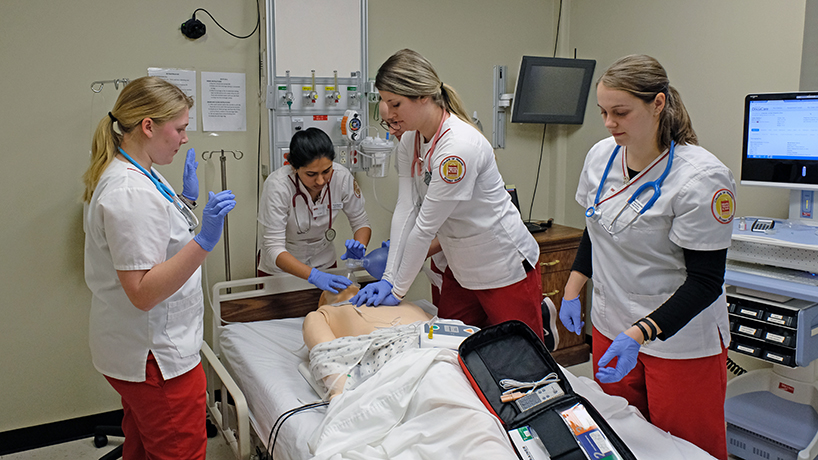
College of Nursing faculty worked to provide students with a variety of virtual learning opportunities to replace everything from the skills lab to simulation learning. (Photo by August Jennewein)
Though Kylie Thompson considers herself an outgoing person, the College of Nursing student found herself unexpectedly nervous when faced with the prospect of calling a stranger to talk.
Not because the conversation would be with a new person, but because this time it would be for school.
“I had never done anything like that,” she said. “Communication has always kind of been a big thing for me, but nursing is new for me. We had a whole course on communication, but then actually having to communicate was kind of difficult, and I got pretty nervous. But once I started talking to him…he’s amazing.”
That “him” was a resident at an area nursing home. Thompson was one of eight University of Missouri–St. Louis students who earned clinical hours by making phone calls to residents, checking in on them during a time when most were isolated from their families and friends because of the coronavirus pandemic. Clinical hours alternatives have become increasingly important since the college suspended normal clinicals after donating all its personal protective equipment to area hospitals in March.
The partnership is the brainchild of Assistant Teaching Professor Beth Dudley who started out with the idea that her students could get practice taking health histories while helping people.
BSN students like Jessi Castile practiced their IV skills on fruit. (Photo courtesy of Jassi Castile)
“There are a lot of psychological issues that go along with being isolated from family and friends,” Dudley said. “I thought it might be nice if they would allow the students to call and talk to their residents. Basically, starting out just getting to know each other and then moving forward getting into how they’re feeling, their health history, and additional clinical questions. This helps to further prepare students to assess the health of their clients when returning to the hospital next semester.”
That experience proved true for Thompson. Her nervousness dissolved as she got to know and bond with her resident, Don, a doctor who was born in the same era as her grandfather.
“I learned a lot from his stories of being a physician,” she said. “I felt like sometimes I didn’t know what to say to patients or I didn’t know how to react to what they would say to me. I already feel like this is going to help me just talking to them.”
Dudley isn’t the only College of Nursing faculty member thinking about how to educate her students remotely. Shawne Manies – assistant teaching professor, Accelerated BSN program director and undergraduate clinical coordinator – has been working to get the various opportunities to students since UMSL class first went remote.
Some of those opportunities have been as hands on as volunteering to screen Amazon delivery workers for coronavirus or contact tracing with the St. Charles County Public Health Department. Then there’s the remote learning that replaces traditional simulation learning.
“We’re taking it day by day,” Manies said. “Because our students were in the clinical about half the standard amount of time, they already got a lot of good time in for the majority of the classes. That’s why it was a little bit easier to go to some of the online virtual stuff.”
Part of moving to virtual learning was working closely with the course leaders to compile their needs and plans for the rest of the semester. Assistant teaching professors Tonya Haynes and Judi Reeves then placed priority on supporting instructors with the use of online simulations.
Haynes and Reeves are both available to answer specific questions about the virtual simulation programming and jump in during the debriefing sessions that take place after the simulation to help with technology or conversation.
“We understand that this is new to everyone and it can be overwhelming,” Haynes said. “Not only to ask questions but ask questions that that are going to facilitate clinical reasoning and critical thinking and spark that meaty conversation without telling the students the answers. We’re helping the instructors do that and reminding them that ‘Hey, we’re here.’”
The online simulations are akin to a choose-your-own-adventure video game where students are presented with a case scenario and work through the decision-making on how to take care of that patient. Students are assigned to different roles and have access to the virtual patients’ logs. At the end, every participant receives a record of the session, which includes a score and areas of strength and weakness.
Reeves especially likes the flexibility of some programs as a teaching tool.
“If the students are getting off track, I can throw things at them to make them think,” she said. “If they’re going really good and they’re getting through it, hitting every single point and I want to challenge them and see if they can go a little bit further, I may throw more things in.”
Thompson, who has participated in three of the simulations, found them engaging and plans to do more for practice.
“They’re actually pretty cool,” she said. “Those things are actually very interesting. They helped me learn a lot.”
Virtual learning isn’t just for simulation. There’s also the skills lab, where students have been practicing fundamental techniques such as starting IVs in whatever way they can – even if that means practicing on fruit.
Manies, who gave her students extra points if they posted those images to Facebook, acknowledges that it’s not exactly the same as practicing on a mannequin in person. To remedy that, the College of Nursing is planning several blitz days in the lab setting when they return to campus.
That’s something Thompson is looking forward to.
“Finding a vein, that’s big,” she said. “It’s a huge step. I’m ready to learn.”















